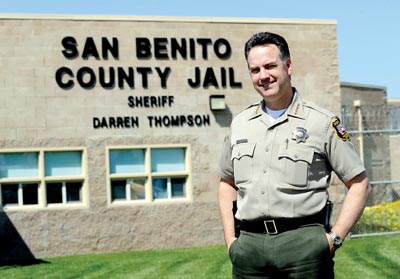People ask Sheriff Darren Thompson all the time if the county deports illegal immigrants who are arrested.
In light of the so-called “Anti-Arizona Law” awaiting possible approval – along with renewed interest in immigration during this election year – the local sheriff wanted to make it clear.
“We do not deport people,” said Thompson, who took over as sheriff of San Benito County, which has a majority Latino population, in January 2011.
Immigration policy is a hot topic among law enforcement officials throughout the state with the State Senate’s approval of the anti-Arizona bill. Thompson in an interview with the Free Lance this week explained the county’s policies, how the new law would affect procedures here and what policies are in place to ensure deputies are not racially profiling local residents.
California would be the first state in the nation to pass an “anti-Arizona” law instructing police to release illegal immigrants instead of handing them over to the federal government if they haven’t committed serious crimes. It could put a Democratic state at odds with a Democratic president whose administration has counted on local-federal police partnerships to find and deport illegal immigrants with criminal records.
The Assembly approved the bill in May and must vote on it again in August after the summer recess, but the big question is if the bill, AB1081, will win the support of Gov. Jerry Brown, who has the power to veto it. Tom Ammiano, D-San Francisco, is the bill’s sponsor.
Brown, as attorney general, signed the pact with the Obama administration allowing federal immigration agents through the fingerprints-sharing Secure Communities program to track down and pick up every deportable immigrant arrested by local police in the state. It has resulted in more than 7,500 deportations from the Bay Area since 2010.
Thompson’s clarification about deportation policy – federal authorities execute such authority – underscores that the county not only has limited discretion when it comes to immigration matters, but also that the local government has taken a relatively hands-off approach on the issue.
Aside from required practices related to the fingerprint database for inmates, the sheriff said the county has its own policy barring any racial profiling and he said staff members receive training to prevent it.
“We have an immigration policy in place that prohibits our staff members from inquiring about immigration status while in the field, unless some extreme circumstance exists,” Thompson said.
Thompson noted that the Secure Communities requirement – which involves entering all jail inmates’ fingerprints into a live scan database – was enacted in August 2011. He explained that it notifies varying agencies, including immigration and customs enforcement, on who has been arrested.
If the federal immigration agency puts a hold on an individual, the county jail gets noticed and keeps the suspect incarcerated.
Thompson said the county jail in 2011 released 44 inmates to federal immigration authorities, who make any decisions on deportation. In 2010, that number was 43.
“The issue becomes, do we hang onto that person and wait for (immigration) to pick them up or do we kick them out the door?” Thompson said.
He said “the rub” locally with the proposed anti-Arizona law is when inmates who are on immigration holds no longer face local charges and have yet to get picked up by immigration authorities – who usually take “a few days,” as he estimated. As of now, Thompson said the jail holds them for immigration authorities unless “prohibited by overcrowding.”
He said it is important to understand who actually gets arrested and entered into the federal database. The county releases all misdemeanor arrests on citations – so they wouldn’t face immigration scrutiny – unless the suspects are too inebriated for release or lack identification.
Ammiano’s “Trust Act” would prohibit police and sheriff’s departments from holding immigrants if they are eligible for release from criminal custody unless they have been convicted of a serious or violent felony.
It also requires local agencies to “adopt a plan” to guard against racial profiling before complying with a federal immigration hold, and also to guard against mistakenly detaining U.S. citizens.
Police chiefs in Oakland, Palo Alto and elsewhere have supported the bill, but sheriffs, who are responsible for county jails, have been less supportive. The Assembly website lists dozens of supporters, including cities, school districts and numerous immigrant rights groups, but just one opponent: the California State Sheriffs’ Association.
Sheriffs oppose the mandate requiring local agencies to guard against racial profiling and detaining U.S. citizens, said Curtis Hill, the former San Benito County sheriff and lobbyist for the sheriffs’ association.
“That’s problematic for us because profiling is so subjective,” Hill said. “That sets up sheriffs and county general funds to get sued. We’re going to get sued based on federal immigration policy.”
Hill said Ammiano’s amended bill has “come a long way” from last year’s version, which was less cooperative with the federal government, but it still makes sheriffs liable if something goes wrong.
“We’re placed in the middle of it all,” he said.
As many of San Benito County’s arrests are done by Hollister police, Interim Police Chief David Westrick emphasized that the city agency considers immigration “a jails issue.”
“My job here is to protect the citizens in this community, regardless of citizenship status,” Westrick said.
He said it is important for all local residents “to feel at ease” about calling police.
“There are some people victimized out there and they’re scared to call us,” he said.
Congressman Sam Farr, D-Carmel, said California for decades has been moving toward more user-friendly police forces and that local enforcement of immigration law is “contrary to what all modern police practices are trying to do.”
At the federal level, Farr said California Republicans are a big part of the problem.
“Everything that needs to be written and needs to be talked about has been done,” he said in an interview with the Free Lance. “It’s just a matter of lining up the votes.”










